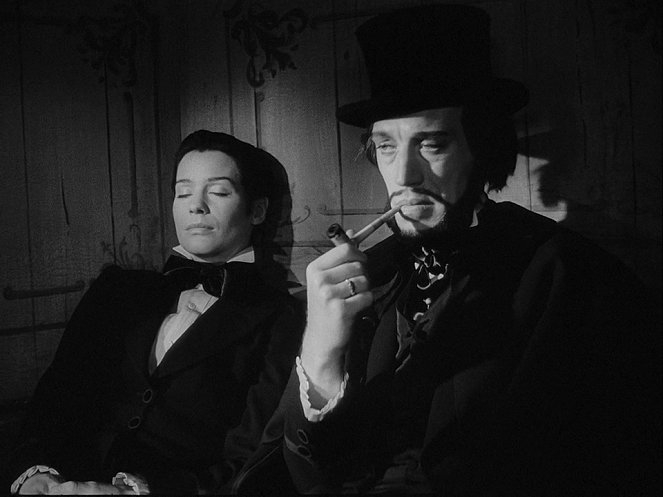Rendező:
Ingmar BergmanForgatókönyvíró:
Ingmar BergmanOperatőr:
Gunnar FischerZeneszerző:
Erik NordgrenSzereplők:
Max von Sydow, Ingrid Thulin, Gunnar Björnstrand, Naima Wifstrand, Bengt Ekerot, Bibi Andersson, Gertrud Fridh, Lars Ekborg, Toivo Pawlo (több)Tartalmak(1)
1846-ban egy mágiával és hipnotizálással foglalkozó mutatványostrupp közeledik Stockholm felé egy batáron. A csapatban főleg a hipnotizőr Vogler számít hatalmas attrakciónak. Stockholm kapujában fel is tartóztatják a batárt, és utasait egy palotába kísérik. Itt a konzul fogadja őket, aki lelkesedik a mágiáért, és szeretné jobban megismerni a művészetüket. Arra kérik Voglert és csapatát, hogy mielőtt engedélyezik nyilvános szereplésüket, mutassák be tudományukat a város vezetőinek. A hatalmasok között persze többen is akadnak, akik felettébb kétkednek a mutatványosok módszereiben, azonban az előadáson megdöbbentő dolgok történnek. (DunaTV)
(több)Recenziók (1)
Characteristically a straddled spectacle. From mystical moods (oh, the grim face of Max von Sydow!), through dark existential positions (when masks fall to the ground and mysticism disappears in the face of humiliation) to Decameron and grotesquely glowing passages that add color and tempo to the film. The story plays with the irreconcilable dichotomy of rational and irrationality, science and deception. Using a bit of cynicism, Bergman answers the question "is there anything outside of this world" somehow outside the main story, through the comic character of a grandmother-herbalist. A relentless battle of two irreconcilable principles is unleashed between the illusionist Vogler and Dr. Verger - a battle between illusion and reality. Who will convince the other about his world? Paradoxically, they both stumble in the same self-deception and are unable to offer more than lies and hypocrisy. The answer to both questions escapes under the seemingly confident and mystical masks they put on. Ingmar Bergman remains not only a patient and expressive observer (by which the film masterfully gives absolute space to the viewer), a tangible thread of sarcasm winds throughout the film, through which he evaluates both "comedian and charlatan" Vogler (following the tradition of humiliated Albert from The Naked Night) and arrogant rationalist and manipulator Verger. There is nothing more tragic than the final "triumph" of one of them, which reveals human existence as a pompous mask that covers a face frightened of death and its own imperfections by a veil of pomp and hypocrisy.
()

